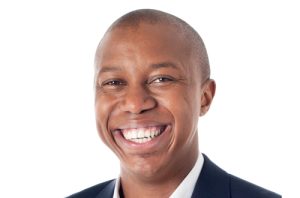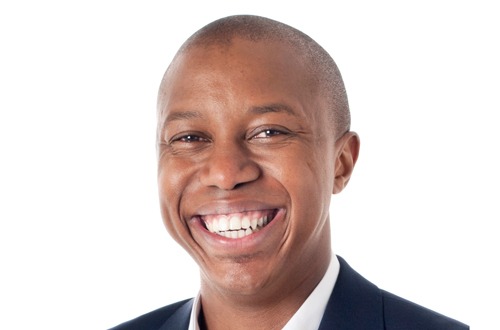
Social capital may be one of the most important resources that a startup founding team might have their disposal, in addition to financial capital.
The concept refers to the collective value of all “social networks” and having the opportunity to leverage off those networks and relationships. For entrepreneurs, this can range from having someone make introductions to potential investors and clients, gaining access to an individual with industry knowledge and expertise to even having a key person sit on your startup’s board of directors.
Katlego Maphai knows just how important connections and relationships can be particularly for a new startup.
Maphai is the CEO of Yoco which he launched together with co-founders: Bradley Wattrus, CFO; Lungisa Matshoba, CTO; and Carl Wazen, CBO in 2015.
Yoco’s point-of-sale app and card readers enable SMEs to accept card payment.
The startup has had a good 2016. They have achieved over 3 000 small business users on their platform and in May they announced their integration with Xero, the New Zealand-based cloud accounting software for SMEs. They were also recently announced the winners of the CapeTalk Small Business Awards with Sage One.
“An example of social capital at its pinnacle is the Silicon Valley. With one meeting or introduction, an individual gets to plug into a vast network of fellow entrepreneurs”
It takes a village
Maphai is a University of Cape Town (UCT) graduate. He says that university is where most of his connections and friendships, including with his co-founders, were made.
When launching Yoco and working to gain traction, he and his team were strategic about making use of the relationships and connections that were at their disposal.
“To make this venture work, we needed a village. Friends, family, ex-colleagues and bosses were all engaged for support. I had never actually asked my friends for anything; there was never a better time to call in those favours,” he says.
The favours ranged from lawyer friends drafting their memorandum of understanding (MOU) with their first payment partners and another helping them put together their structure pro bono; to a friend well versed in asset management becoming their first angel investor, another friend was able to connect the team to a family member who is a board member at what later become their partner bank, to smaller acts like friends offering him their couches when traveling on business.
“Having access to this was invaluable at the time,” says Maphai.
SME South Africa speaks to Maphai about his definition of social capital and his direct and intentional approach to networking.
Q: What does social capital mean to you?
Social capital is the availability of resources through a personal network consisting of family, friends, acquaintances, existing and former colleagues. The system develops over a lifetime and career, starting as early as attending school. I see it as a ‘help option’ that can be exercised at any time to further personal objectives.
An example of social capital at its pinnacle is the Silicon Valley. With one meeting or introduction, an individual gets to plug into a vast network of fellow entrepreneurs who genuinely want to help and see you succeed in your venture. I believe this is the secret sauce behind the continued success of the valley.
Q: How big of a role would you say it has played in Yoco success?
Social capital has played a significant role our progress to date. A great deal of our achievements at Yoco links closely to our ability to learn the payments industry fast, recruit great talent before we could afford it, establishing quality local and foreign partnerships and raising capital from the right sources. Already challenging, without social capital, all this would have seemed impossible.
“Social capital allowed us to attract the talent in the first place and convince them to take a leap of faith with us”
Q: How important has social capital been in being able to access investors, customers, experts and strategic alliances?
Our ex-colleague from Delta Partners’ – Cornelia, had taken our first meeting and kicked off negotiations with our payment processor based in Munich. She had just moved there. We were able to secure an international partnership that ensured that our merchants were able to use the world class payments technology from day zero.
Our relationship with our partner bank is unique. After a year long due-diligence and getting through, our partner bank gives us incredible flexibility to innovate in a compliant way.
The partnership required social capital for a warm introduction via an ex-colleague from Rocket Internet (who were looking at the space, but have a year like we did).
Pushing it to the bank’s board: Beyond the quality of our submission, having the ex-head of Visa Sub-Saharan Africa join our advisory board before the due-diligence submission made a material impact.
Finally, a non-exec board member at the partner bank had been someone I was acquainted with through a friend many years back. He helped to get us a credible audience with the CEO.
Q: In what other ways has having a wide network been useful?
Hiring for the first Yoco team came via our professional networks. Either people knew directly or came recommended. Unable to pay market-related salaries, we were able to entice the talent to the venture though our purpose and generous equity scheme. Social capital allowed us to attract the talent in the first place and convince them to take a leap of faith with us.
When we started looking at the venture, we knew nothing about the payments industry. Through introductions, we were soon able to speak to experts from the payments industry who taught us a lot and pointed us in the right direction.
Q: Who in your network does the team reach out to regularly – especially as a young startup
We engage our advisory group quite actively across topics such as fundraising, risk management, governance, expansion, team dynamics and product development. Engagements happen weekly in parallel across the different areas.
“Intentional networking is incredibly effective; the opposite holds true for aimless networking”
Q: Can you give us some insight into whether the Yoco founders network and if so how?
We are active networkers, employing a direct and intentional approach. Our local ecosystem is in its early days and is still has a long way to go. To ensure we keep our thinking at the right level, we have dedicated a good amount of time interacting with external ecosystems based in the United States and Europe. We even engage our global counterparts in these markets, even though they can become the competition in the long-term as we all look to expand beyond our home markets and regions.
Q: Any advice for young entrepreneurs that may not have access to the right network especially those based in rural areas or the townships?
Intentional networking is incredibly effective; the opposite holds true for aimless networking. I learnt down the line in my career that experts like to be engaged in their subject matter areas. They get energised by it and are often happy to share in abundance. Your ability to clearly define your problem or question and find the right person to engage is crucial. LinkedIn is a powerful tool for this. Unlike before, you now have a catalogued database of global expertise you can access instantly. The ability to ask the right person, the right questions yields great results.
More often than not, this is how we found our first advisors and even some members of our initial team. We engaged them as experts and built lasting relationships off this.
Q: How do you contribute towards other’s social capital if at all, e.g mentorship?
We take all speaking requests to young people looking to learn more about entrepreneurship. We’ve also opened up our offices to visitors who want to see the inner-workings of the venture and meet the team. I’ve also never said no to a young person seeking specific advice on a well-defined problem. Subsequently going on to make introductions to the right people where it can be of assistance.






